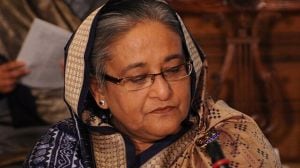Professionalism is just another word
The I-League is nearing conclusion. There have been upsets galore, and some action within the mega activity zone of cricket. By the book, semi-professionalism in soccer has been replaced by a professional set-up in India. So what has changed? The Indian Express tried to look into the minds of those who matter, and came up with some disturbing emotions. Today we present the first part of a two-part series.

The I-League is nearing conclusion. There have been upsets galore, and some action within the mega activity zone of cricket. By the book, semi-professionalism in soccer has been replaced by a professional set-up in India. So what has changed? The Indian Express tried to look into the minds of those who matter, and came up with some disturbing emotions. Today we present the first part of a two-part series.
Professionalism was an alien concept to Indian soccer. It has survived on the brink of disaster for long, in a rather amateurish format, and corporate intervention has advanced to sponsorship or in turning clubs into Pvt Ltd companies to push grant money through without too much accountability.
When the All India Football Federation (AIFF) wanted a change — because FIFA and the AFC said it must, to be able to gain from the available dole — the clubs were up in arms. There was no infrastructure of any kind in place, but suddenly there was professionalism. It seemed impractical.
Taking all claims into account, the AIFF had gone back on its minimum-requirement rules — as set by its executive committee — for clubs, toning them down for gradual introduction.
With the I-League three-fourths through, the general feeling so far is that the change has been in the nomenclature of the league. There has been no perceptible upgradation from the National Football League (NFL) days.
An official of the federation said that there are changes in the new league but it will take time before it becomes fully professional.
“The NFL was a semi-professional structure, and the transition will take some time. There is no significant change that I can notice in this league. You need to have dedicated people and everyone has to play a role. It cannot be a one-man show, everyone has to be consulted and there should be combined strategy,” said the official who wished anonymity, discontent clear in his voice.
“I think the cumulative effort is missing, and until that happens, total professionalism would be an uphill task. Also there has to be more sponsors and investment should be there,” he said.
The disaffection rises from a general feeling that there is hardly any sharing of workload in the federation, no delegating authority and responsibility, and certainly no information available beyond the narrow corridors that include the select few.
If that is the situation within the federation, one cannot blame those who aren’t on the federation’s payroll.
Anjan Mitra, secretary Mohun Bagan, feels that there are hardly any residential academies running in India and the players are not completely professional. “Apart from the Tata Football Academy, there is the Mohun Bagan Football Academy. Where would be the source of players for the future? And structure-wise, there is little difference between the I-League and the NFL. It is one and the same,” he said.
What he is saying is important. The federation beats a drum about it, but the clubs don’t feel it, their officials don’t feel it, and the players don’t feel it. “Whenever we play a game it is just like another match for us. Also, the quality of refereeing is very poor. The standard of the Maldivian referees is worse than the Indian referees,” Mitra said.
It isn’t exactly an emotional outpouring, neither it is about money. Mitra is talking about the AIFF’s apathy in looking after a player when he is injured. “Most of the clubs have a doctor/physio,” but does the federation ensure one at all times, for all players?”
There comes the distinction of I-League and national squad. A thin line separates the two, and the old trouble of why a player would want to or not want to play in the national squad came up.
“Why would a player represent India? Look at the case of Deepak Mondal. He has not played even a single match from the club after he was injured during the Indian camp. And the AIFF is not concerned about his health. I wrote many letters to AIFF but they respond back by saying the president is busy. No one knows who will pay his salary,” Mitra said.
Part I concludes
• Part II: Old wine in new bottle



- 01
- 02
- 03
- 04
- 05




























